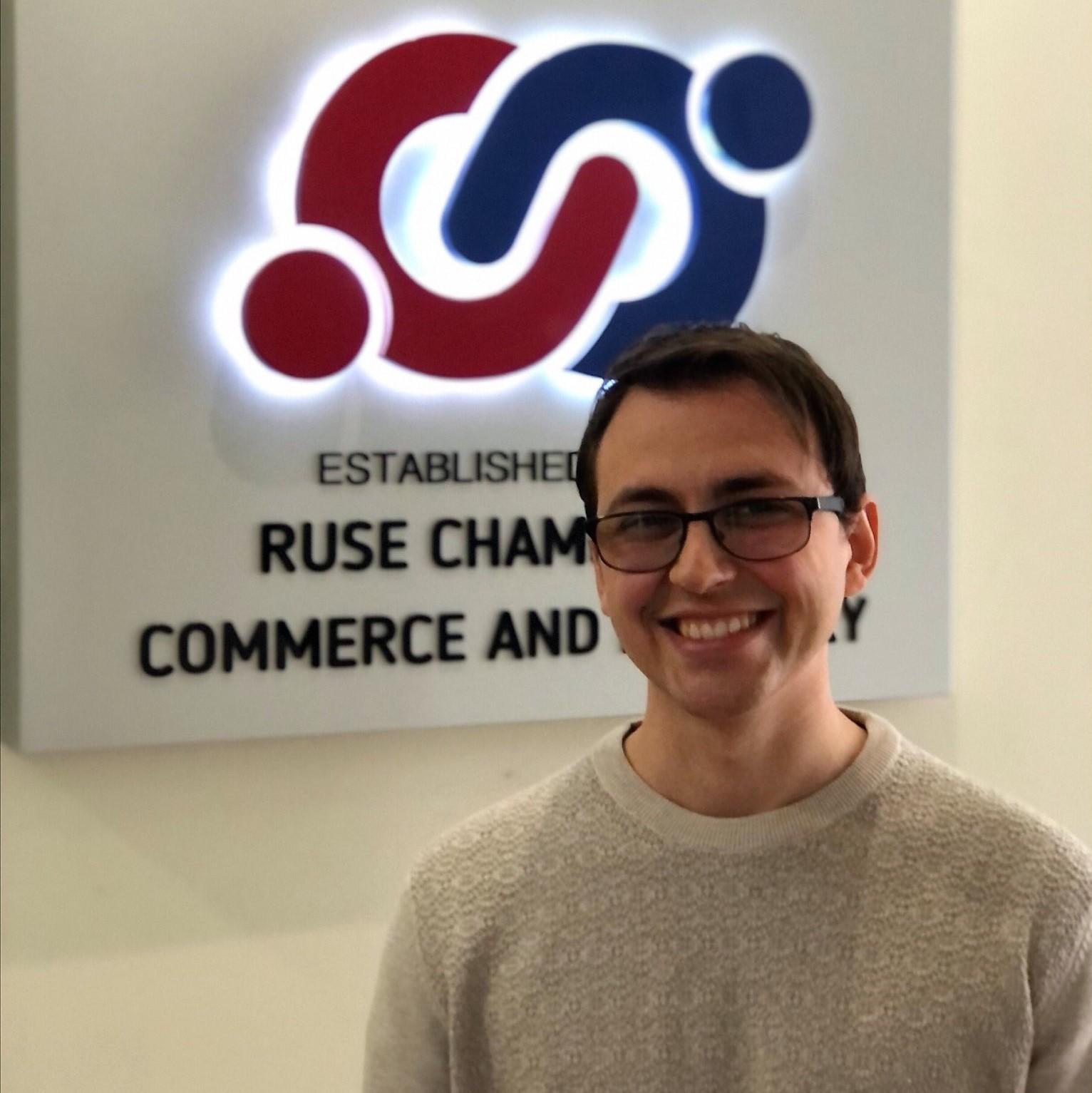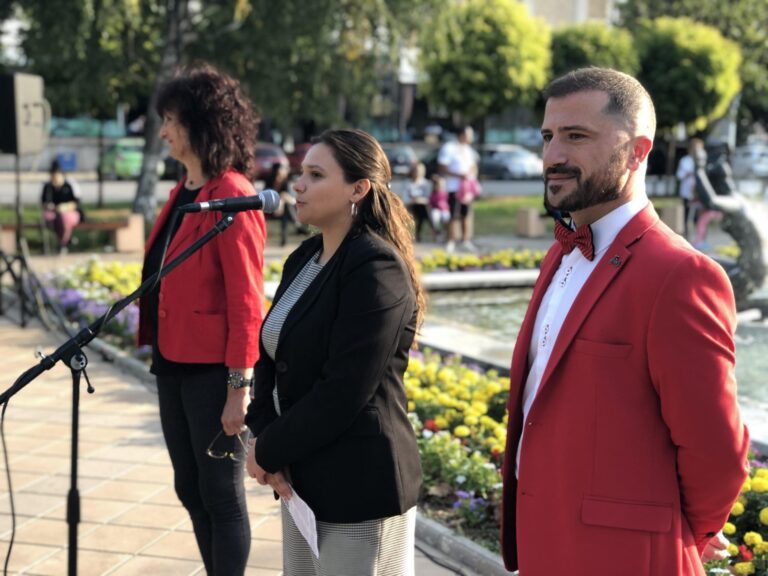Even if an entrepreneurial idea does not materialize, the efforts will be rewarded
Tsvetelin Nikolov is co-founder and co-owner of "Pleggi” – a digital solution for pre-selection of personnel. stepping on time-established scientific methodologies (psychometrics, neuroscience), modern technologies (Machine Learning, Big Data) and gamification. The main objective of "Pleggi" is to assess the potential of job applicants in an interactive way, through a set of scientifically validated short online games that derive valuable metrics about their behavioral, personality characteristics (soft skills) and values. This information aims to help job candidates and employers at the same time, upgrading the standard CV and increasing objectivity and efficiency in the preliminary selection of personnel, who will fit in the corporate culture and the specifics of the given position to the maximum extent. Tsvetelin, or Tsetso as his friends call him, is an extremely intelligent and energetic young man who took the difficult path of entrepreneurship and achieved enviable results for his age. That is why RTIK turned to him in order to understand how to become a young entrepreneur in Bulgaria and how organizations like ours can most successfully support other young people like him.
Can you introduce yourself in 2-3 words?
My name is Tsvetelin Nikolov, 26 years old, married, Master of Business Administration and a young entrepreneur. For several years (already 5/) I have experience in business development in a software company and at the moment I am developing my own software company in a quite innovative field.
Why did you choose this path for yourself? Why did you choose to be an entrepreneur?
The truth is that everyone has someone or something in their life that inspires them. Seeing how someone has done something very interesting, one says to himself "I want to do the same"!
From a very early age, I wanted to be an inventor, to create something that would help others. Since I was at odds with the machines at the time, I told myself it wouldn't be. But entrepreneurship is about realizing, inventing ideas that are useful. And I want to create, to help, that's why I turned to him. In addition, my life's journey, however small it may be, met me with people who were already doing it.
Then I thought why not?
How did it all start? What is the path you have taken so far?
My journey as an entrepreneur began in my student years. Every company creation project I've done as if it was going to be real, in the best possible way. I knew I was working in a secure environment where you operate and test. This was a gamified approach that some of my professors at university used. And I realized that this is the right method of assessment and learning. Since then, I fell in love with gamification and told myself that this is how I want to do things. In parallel, I went to events for training and development of human resources, but very soon I realized that this was not for me and that I was not the strongest there, but practicing in the field of human resources showed me that the most valuable resource of an organization is the human one. So gradually, together with colleagues who think like me, the idea of Pleggi.
What were the difficulties and problems you encountered along the way?
The first difficulties we encountered were related to deadlines and motivation. Everyone is looking for a quick result, but we realized that it will not come soon. This led to demotivation in the team even though we were very inspired and believed in our success.
Reality has shown us that things don't always happen at the speed you imagined.
The programmers helped us a lot, not only with their expertise, but also by lying to us that it would be done quickly. So we already know that when the programmers say that something will happen in X time, we multiply it by 2, 3, even 4. But the important thing is that then we have the time horizon.
Ambiguity in deadlines is an obstacle, and a big one, because you cannot plan what your next step should be.
Another major difficulty is related to gathering a suitable team.
How did that happen for you, how did you bring the members of your current team together? Where did you meet them? Your education and your environment at that time have nothing to do with IT environments.
It is normal for everyone to try to realize their idea with friends and acquaintances at the beginning. (I don't recommend doing it with relatives.) Subsequently, acquaintances of acquaintances were brought into the team so that the appropriate piece to the puzzle could be found and the machine worked.
The truth is that I was an extremely proactive student and I participated in many events as a volunteer, one of which was for game creation, where I met programmers, designers, sound engineers and all kinds of people who can create games. In this way, I made a lot of contacts.
Later, my job at a software company helped me start to understand them better and to know the given programmer if he has the expertise in the area I need.
Do you think that access to contacts, to networking, to various specialists contributed to the crystallisation of your entrepreneurial idea?
Of course. If an idea doesn't change, then something is lame, then you haven't collected enough feedback. There are probably some brilliant ideas that do not need to be changed, but my opinion is that 99.9% of the ideas are modified and this is done based on the feedback - whether as a result of the market, whether because of the opinion of future customers, mentors, etc. n.
I don't recommend taking the feedback of friends and family too seriously, as they can always be a little more supportive or encouraging than necessary. In my case it was not like that - almost everyone, with few exceptions like my wife, said "don't bother".
Has the lack of support from your loved ones discouraged you?
The environment is extremely important. We don't choose our family, but we do choose our friends. I have certainly already created an environment for myself. I started interacting more with like-minded people, which is how I get valuable feedback, motivation and ideas. This environment came as a result of communicating with many people, participating in various events, projects, etc. Now even my family believes in the idea!
Was there anyone to support you? Was there access to information about existing support programs?
The truth is that among my professors I met people who were my mentors. But I'm a special case and it doesn't happen to everyone!
There is not enough information about the processes of creating an idea. It is necessary for every entrepreneur to answer some questions in advance. To understand how this idea is useful - is it social entrepreneurship, can this idea make money or not. Because a business that cannot support itself is not a business.
It is necessary to work more in this direction through clubs, mentoring, accelerator programs. I know they exist because I've been interested, but are they everywhere? Or only in the city-state of Sofia? If you are from a less populated place you are limited. I am from Kozloduy and there is no one there to support young entrepreneurs. And they can be grown even at school.
Am I to understand that the most correct approach to stimulate youth entrepreneurship is personal example? Through meetings with mentors while still in school?
Yes, a good example inspires. You can help with your experience, your expertise, your interesting and inspiring story.
You are not talking so much about training and accelerator organizations, but rather about practitioners, about real entrepreneurs?
I'm a fan of practitioners. I don't think they are better than theorists, but I think meeting real entrepreneurs is really valuable. There must be synergy here too!
Do you think that young entrepreneurs have access to useful information about programs, competitions, networks and trainings?
I know there are similar opportunities and programs, but they are not enough. If we wait for them to inspire us and give us everything without putting in the necessary effort, things will not work out. They provide the necessary knowledge, but without the necessary passion and energy, nothing will happen. At the same time, I don't think these programs are marketed enough. Many people do not know about their existence. Personally, I would make more use of the communication channels in social networks, where many entrepreneurs can actually be found.
Let's go back to your business idea. To date, what form of support would be most helpful to you? You now have a viable product.
Yes it is! We are looking for investors who, in addition to supporting us financially, also through expertise, knowledge, skills and contacts.
I'm not a fan of going to accelerator type shows and events especially after one stage of the business - having as you said a viable product. Why? You go, you show up, and you expect to attract an investor. You are a kind of entrepreneur on a feeder of different events - accelerators. Your job is to create! I know a business very close to us that spent all their money on exhibitions in Europe and they didn't get funding. If they had invested their time, effort and money differently, surely things would have looked different for them. In my opinion, good ideas should be shown, but not solely relied on.
And how can contacts be made if not by attending such events for entrepreneurs?
By proactively searching for the contact of the people we are interested in. Excluding events - accelerators, it remains to find them offline at events they are interested in and online by answering a few questions. What social networks are they on? What do they like? What is their business? Do they have public emails, phones? For example, I like to use LinkedIn. I find the person, research him and write to him, sometimes choosing the time in which I write, including important things about the person himself, it may even be related to things he shares on the same network, and only then would I introduce myself and subsequently my business.
If a business support organization wants to be as effective as possible, should it personalize its support in some way?
Absolutely. That is how true value will be obtained.
It is necessary to first determine the stage at which the given project, idea, business is in order to offer it the necessary knowledge and guidance - sales, marketing, finance, accounting, human resources.
Here I would also like to draw attention to legal support, which is very important. Most young entrepreneurs do not realize the role and importance of lawyers until it is necessary at the last minute. If they use them correctly, lawyers will be "pit bulls" who will protect them and protect them from problems. They can even help them a lot to win partners, support and further develop and clarify the business.
You are quite young. Would you say if there were times when your age put you in any kind of obstacle? Have you faced prejudice?
Even now I face prejudice. Sometimes it's hard for me to get the attention and support of HR experts who don't believe that people younger than them can improve processes and solve years-old problems. I admit that this hinders, but also develops sports malice, which for me is useful. It was the prejudices of others that made me seek and learn more to be able to demonstrate a different expertise.
The truth is that my age can also be seen as a plus, because it is a great excuse - I am young and learning. Expectations for youngsters are not that high and when mistakes are made, the doors are still open. If I were older, that might not be the case.
Most of the questions in the interview were related to external obstacles and external support for young entrepreneurs. What you shared with us was focused on internal motivation and self-effort. Where is the key to the success of a young entrepreneur?
Both the external and internal environments matter. There should be synergy between them. If the feedback from mentors, institutions and organizations directs them to set more specific tasks and goals, then surely young entrepreneurs will understand that even if their idea does not come to fruition, the experience, practice and skills gained will be useful to them for every single thing going forward. The truth is that even if the idea does not materialize, the effort will be rewarded. Since being an entrepreneur I am much better at my job because I now understand the business much better. I understand how the money flows, I understand the team, the motivation, every single thing.
Most young entrepreneurs are shy and do not want to tell their idea live in front of many people. Many of them guard and hide their ideas. I myself lost a year guarding ours so that no one would steal it from us. After thinking about it, I realized that even so, someone could steal it from us. As soon as an idea develops in one person's head, it is sure to develop in the head of another. Either you act or someone else will before you. The game never stops!
This interview is part of the Better Incubation international program (http://betterincubation.eu/). Better Incubation is a 2-year program (2021 – 2023) powered by the LIAISE project, funded by the European Union's Employment and Social Innovation programme. The project aims to promote inclusive and social entrepreneurship in Europe by mobilizing and empowering business support organizations (BSOs) with tools and good practices to effectively support social enterprises. The program focuses its assistance on entrepreneurs falling into one or more of the following groups - youth, people with disabilities, women and people over middle age to support their inclusion in society, through the implementation of socially significant business ideas.






